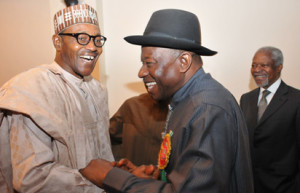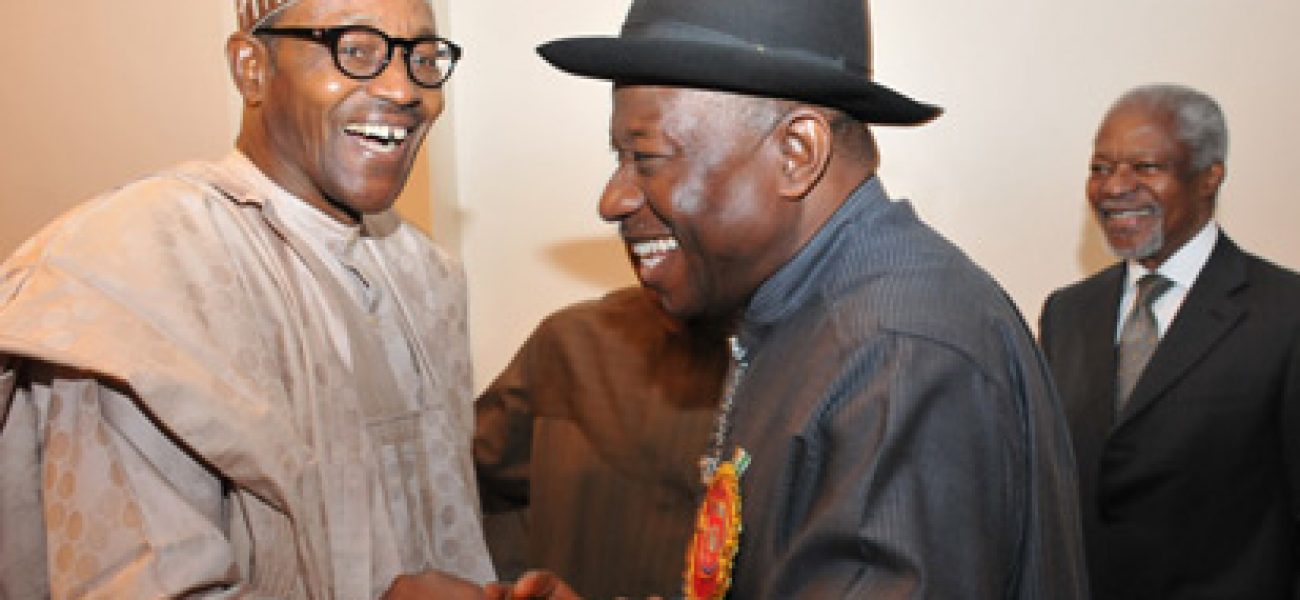 Set against the history of electoral violence and inflammatory statements that have become a recurrent theme in elections in Nigeria, President Goodluck Jonathan, General Muhammad Buhari and twelve other Presidential candidates signed a peace pact promising free and fair elections and issue-based campaigns in a sensitisation workshop held in Abuja on Thursday January 15, 2015.
Set against the history of electoral violence and inflammatory statements that have become a recurrent theme in elections in Nigeria, President Goodluck Jonathan, General Muhammad Buhari and twelve other Presidential candidates signed a peace pact promising free and fair elections and issue-based campaigns in a sensitisation workshop held in Abuja on Thursday January 15, 2015.
The peace pact (also known as the “Abuja Accord”) have the potentials to prevent candidates and political parties from making public statements, pronouncements, declarations or speeches that have the capacity to incite violence including those that involve religious, ethnic or tribal incitements before, during and after elections. The agreement also prevents institutions of government such as the Independent National Electoral Commission, (INEC) and security agencies from acting in a manner that would encourage electoral violence. At the signing of the pact, Mr Emeka Anyaoku, the former Secretary General of the Commonwealth and Chairman of the event, stressed that the workshop was necessary due to the increasingly provocative words used by candidates and its attendant consequences in the country.
On the one hand, the peace accord has been commended as an innovative approach to curb electoral violence in Nigeria by encouraging aspiring candidates to appreciate the needs of the general electorate and, hence, moderate their campaigns accordingly. For instance, by encouraging more debates among political aspirants on qualitative education, improvement of power supply, creation of employment and improvement of the economy, the peace pact intends to shift the focus from individuals to party policies.
On the other hand, some critics dismiss the pact move as calculative and a little too late in the light of the already inflammatory statements made by some of the Presidential candidates and members of their parties. They also point to the recent advert, “Nigerians Be Warned,” credited to Ekiti State Governor Ayo Fayose in national newspapers where he made insinuations about Gen. Buhari being terminally ill, he compared him with former Presidents from his region who died in office. Such insinuations merely highlights the weaknesses of implementing such an agreement as no action has been taken since its breach despite a provision in the Accord providing for the monitoring of its implementation. Further, the peace pact appears to be overly focused on politicians and institutions of Government to ensure the peaceful outcome of elections leaving out the influence of religious and traditional leaders in instigating others.
The Accord comes at a time when many have predicted that the 2015 General elections are most likely to be marred with electoral violence as the stakes have never been so high. Nonetheless, with the elections being less than a month, the hope of all well-meaning Nigerians is for peace to reign during and after the election.

